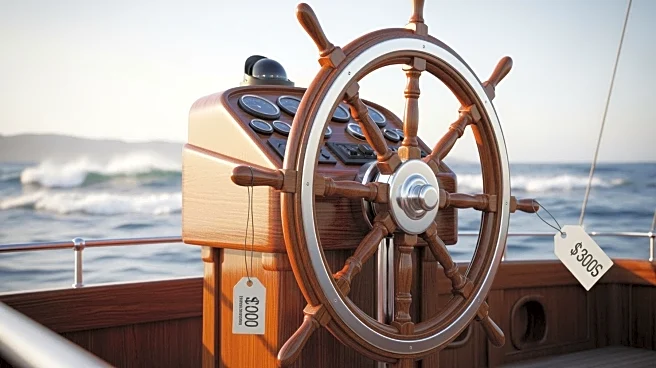What's Happening?
A panel of five leading Greek shipowners has expressed strong opposition to the International Maritime Organization's (IMO) Net Zero Framework (NZF) during the Cyprus Maritime Conference in Limassol. The
shipowners argue that the proposed climate regulations were developed without adequate industry consultation and could lead to increased consumer prices. Among the panelists, Semiramis Paliou, CEO of Diana Shipping, was the sole dissenter, while others like George Procopiou and Andreas Hadjiyannis criticized the regulations as ineffective and potentially counterproductive. Procopiou described the regulations as a 'kolotoumba,' a Greek term suggesting they might achieve the opposite of their intended effect, raising costs and emissions. Hadjiyannis further argued that the maritime industry's contribution to global CO2 emissions is negligible.
Why It's Important?
The criticism from Greek shipowners highlights a significant divide between industry leaders and regulatory bodies on climate action in maritime shipping. If the IMO's Net Zero Framework is implemented without addressing these concerns, it could lead to increased operational costs for shipping companies, which may be passed on to consumers through higher prices for goods. This situation underscores the need for collaborative approaches to environmental regulations that balance ecological goals with economic realities. The maritime industry plays a crucial role in global trade, and any disruptions or cost increases could have widespread economic implications, affecting supply chains and consumer markets worldwide.
What's Next?
The debate over the IMO's Net Zero Framework is likely to continue, with industry stakeholders pushing for more inclusive discussions and practical solutions. Shipowners may seek to engage with the IMO to advocate for regulations that are both environmentally effective and economically viable. The outcome of these discussions could influence future policy directions and the adoption of green technologies in shipping. Additionally, the industry may explore alternative fuels and technologies to reduce emissions, aligning with environmental goals while maintaining economic competitiveness.
Beyond the Headlines
The controversy surrounding the IMO's Net Zero Framework reflects broader tensions in global climate policy, where economic interests often clash with environmental objectives. This situation raises ethical questions about the responsibility of industries to contribute to climate solutions while ensuring economic stability. The maritime sector's response to these challenges could set precedents for other industries facing similar regulatory pressures, potentially influencing global approaches to sustainable development.











